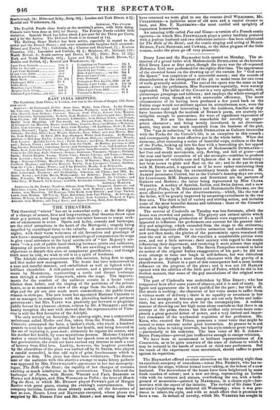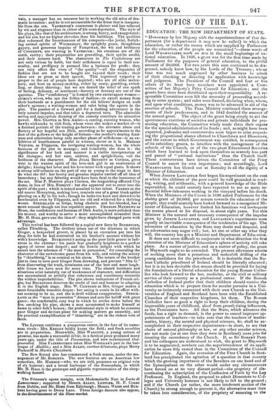The Haymarket offered no other attraction on the opening night
than its excellent company of comedians—minus Mrs. blisaurr, who has re- tired from the stage, without formal leave-taking, at the behest of a new husband. The decorations of the house have been heightened by some fresh touches of colour; and a new act-drop, representing an Italian villa with its terraces and statues, overlooking the sea, with a back- ground of mountains—painted by MARSHALL, in a chaste style—har- monizes with the aspect of the interior. The revival of Sir JOHN VAN.. BRUGH'S Confederacy was deferred till Wednesday ; when it was pro- duced in admirable style, and with so much effect that it promises to have a run. In default of novelty, which Mr. WEBSTER has soughs in vain, a manager has no resource but in working the old mine of dra- matic invention : and he is not accountable for the dross that is insepara- ble from the ore. VANBRUGH*8 coarseness is plainer and less relieved by wit and elegance than in either of his contemporaries. The style of his plays, like that of his architecture, is strong, heavy, and exaggerated ; and his aim has no higher elevation than his buildings. The qualities that redeemed the licentiousness of his compeers—the jovial, frolick- ing animal spirits of WYCHERLEY, the sprightly grace, thoughtless gayety, and generous impulse of FARQUHAR, the wit and brilliancy of CONGREVE, are wanting in VANBRUGH : his creations are of the earth, earthy ; their propensities are grovelling, their spirits sordid, and their natures hard. The characters in The Confederacy are not only vicious by habit, but their selfishness is equal to their sen- suality, and profligacy is pursued like a business for profit : they can only affect the vices of "the quality"—all the elegancies of fashion that are not to be bought are beyond their reach ; their ideas are as gross as their speech. This ingrained vulgarity is proper to the set of people here depicted ; who are all alike merce- nary, and bent on money-making, either by usury, gambling, swind- ling, or direct thieving ; but we are denied the relief of one spark of feeling, delicacy, or sentiment—honesty or decency are out of the question. The "confederacy " is formed by two extravagant women— citizen's wives, who ape the follies of fashion—to extort money from their husbands as a punishment for the old fellows' designs on each other's spouses ; a waiting-woman and valet being the agents in the plot. The passion of a forward girl for a dashing adventurer is the only natural impulse, and that takes a depraved turn. The admirable acting and appropriate dressing of the comedy constitute its attractive power. Mrs. GLOVER as Mrs. Amlet—a canting, cunning woman, who hawks nicknacks to rich fools, whose vices she makes a market of—is a finished portrait of the trading go-between : the alternate abuse and flattery of her hopeful son Dick, according as he approximates to the foot of the gallows or the height of fortune—the mother's doating fond- ness and admiration being only another phase of selfishness—is an ex- hibition of heartlessness painful to witness, clever as it is. Madame VESTRIS, as Flippanta, the intriguing waiting-woman, has the whole business of the plot to manage ; and inimitably she does it : the significance of her look and manner is a visible interpretation of the dialogue ; and her ease, address, and sprightliness, veil the boldness of the character. Miss JULIA BENNETT as Corinna, gives Vent to the wanton spirit of the love-sick girl in an exuberance of delight ; kissing her lover and his love-letter with equal gusto. It shows a strong self-reliance on the part of one so young to the stage to dare do what she did : her hearty and genuine impulse carried off all idea of immodesty ; but any faltering would have been fatal to the innocence of the act. Miss P. HoRrost plays Clarissa, the languishing affected City dame, in lien of Mrs. NisBErr : but she appeared not to enter into the spirit of the part ; which is indeed unsuited to her talent. FARREN as the old usurer Moneytrap, making love, reminds one of a great black spider gloating on a fly in his web ; though he looks too keen and shrewd to be bamboozled even by Flippanta, and too old and withered for a thriving wooer. STracKLAND as Gripe, being choleric and hot-blooded, has a more sensual though not less repulsive aspect. CHARLES MATHEWS as Brass, the confederate and footman of Dick Amlet, is more polished than his master, and worthy to serve a more accomplished scoundrel than Dlr. H. Hors. gave one the idea of : they might have changed parts with advantage.
This revival has been followed by a capital new farce by BUCKSTONE, called Thimblerig. The drollery arises out of the dilemma in which Ginger, a henpecked grocer, is placed by an execution put into his shop for debt he had contracted on his brother's account without his wife's knowledge. BUCKSTONE'S acting as the poor little grocer is ludi- crous in the extreme : his panic fear gradually heightens to a perfect agony of terror and despair ; and the frantic delight with which he enters into the schemes of "the man in possession," for concealing the character of the unwelcome guest from his wife, and raising the money by " thienblerig," is as comical as his alarm. The return of the brother just in time to save poor Ginger from drowning, and prevent "Mrs. G." from discovering the truth, terminates one of the best and most laugh- able farces we have seen for some time. The absurd incidents and situations arise naturally out of weaknesses of character, and difficulties are accumulated so artfully that coherence and consistency reconcile the wildest improbabilities. The plot shows indications of French ori- gin, but BUCKSTONE deserves the credit of tact and humour in adapting it to the English stage. Mrs. W. CLIFFORD as Mrs. Ginger makes a most formidable domestic despot : her acting is comic in its effect with- out seeming to be so, and she is droll without exaggeration. STRICK- LAND as the "man in possession" dresses and acts the bailiff with great gusto : the comfortable, easy way in which he settles down before the fire, smoking his pipe, shows a man accustomed to make himself at home in other folk's houses ; the professional style in which he consoles poor Ginger and devises plans for making matters go smoothly, and his practical exemplification of " thimblerig," are in the richest vein of farce.



























 Previous page
Previous page